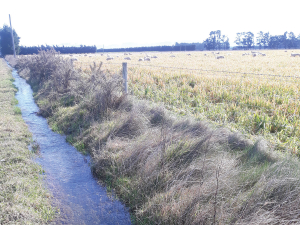Simon Upton urges cross-party consensus on New Zealand environmental goals
Parliamentary Commissioner for the Environment Simon Upton is calling for cross-party consensus on the country's overarching environmental goals.
 Farmers in Waimakariri district in North Canterbury are considering the impact of hard-hitting nutrient management rules. The district council is concerned too.
Farmers in Waimakariri district in North Canterbury are considering the impact of hard-hitting nutrient management rules. The district council is concerned too.
A Canterbury district council wants a rewrite of proposed regional council rules for excluding stock from waterways.
In a submission on Environment Canterbury’s Plan Change 7, Waimakariri District Council (WDC) wants Environment Canterbury (ECan) to allow exemptions for stock in waterways as a controlled or restricted discretionary activity.
This would allow exemptions from stock exclusion under certain conditions, for example so that stock could access stockwater drinking bays.
WDC also wants Environment Canterbury (ECan) to change its land and water plan so it can continue community water supply and stockwater race network schemes.
Defining WDC as a “principal water supplier” would require it to seek resource consent “for any discharge of nutrient onto land that would result in contaminant entering water from the stockwater race network or community water supply,” the district council said.
An irrigation supplier and/or holder of a discharge permit should be responsible for complying with nitrate reduction targets, WDC says.
Commenting on water efficiency, WDC says the district’s stockwater race network is not a managed aquifer recharge system.
“There is incidental aquifer recharge. Mitigation of nitrate-nitrogen, and the associated costs, should be addressed and paid for by nitrate-nitrogen polluters with effects-based rules and mitigations,” WDC said.
WDC suggests ECan remove the phrase “system used to convey water” owned or operated by Waimakariri District Council (which has no definition) and replace it with “artificial watercourse used for irrigation and/or stock water” to exclude other water systems such as urban stormwater and wastewater networks.
WDC’s submission questions ECan’s definition of natural water bodies in the catchment, particularly smaller creeks, streams and waterways which flow only periodically.
The council’s submission echoes farmers’ worries about whether they can be expected to mitigate nitrate pollution into such irregular waterways.
WDC says overall it is broadly in support of ECan’s proposed Plan Change 7 to the Canterbury Land and Water Regional Plan.
But it challenged rules on vegetation clearance and earthworks, which had been amended to provide for freshwater species habitat. On the planning maps, the rivers and tributaries areas affected (marked in purple) are “fairly extensive”, WDC says.
The district council predicts a potential duplication of powers of the Resource Management Act 1991, which empowers territorial authorities with controls in this area, and the Regional Policy Statement.
WDC recommends that the definition of “principal water supplier” be altered to exclude “community and/or stock water scheme”, otherwise nitrate reduction and contaminant discharge rules will apply to the stockwater network and community water supplies.
The council also argues that policies for the habitat of indigenous freshwater species are too wide ranging and unfairly restrictive to territorial authorities. WDC recommends that the definition of “surface water body” be replaced with “river, wetland or lake” to avoid the unfairly restrictive statement “in same surface water catchment”.
WDC also asks ECan to consider the impact of its nutrient management proposals on urban areas.
WDC says nutrient management proposals would also “capture” an unworkable additional number of lifestyle blocks in the district.
At least 1000 properties greater than 5ha and smaller than 10ha would be affected, the council says.
“The compliance costs of enforcing these rules in this district -- rules that will not apply to the balance of the Canterbury region -- would not seem to justify the perceived environmental benefits.
According to the latest Federated Farmers banking survey, farmers are more satisfied with their bank and less under pressure, however, the sector is well short of confidence levels seen last decade.
Farmer confidence has taken a slight dip according to the final Rabobank rural confidence survey for the year.
Former Agriculture Minister and Otaki farmer Nathan Guy has been appointed New Zealand’s Special Agricultural Trade Envoy (SATE).
Alliance Group has commissioned a new heat pump system at its Mataura processing plant in Southland.
Fonterra has slashed another 50c off its milk price forecast as global milk flows shows no sign of easing.
Meat processors are hopeful that the additional 15% tariff on lamb exports to the US will also come off.